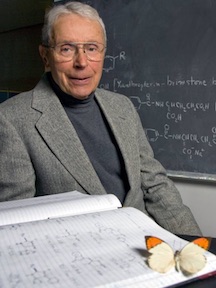By Allen Brewer
Edward C. Taylor, a former chemistry professor at Princeton University, passed away on November 22, 2017 at the age of 94. His research into butterfly wing pigments led to the development of a cancer-fighting drug used worldwide.
Taylor was born on August 3, 1923 in Springfield, Massachusetts. In 1946, he received his B.A. from Cornell University were he became a member of Phi Beta Kappa.
He was a Merck Postdoctoral Fellow at the National Academy of Science from 1949 to 1950 in Zürich, Switzerland. There he worked under Leopold Ruzicka, who was a 1939 Nobel Prize recipient in chemistry.
In 1950, Taylor began work as a DuPont Postdoctoral Fellow at the University of Illinois. A year later, in 1951, he became a member of the faculty there.
Taylor joined the Princeton faculty in 1966 as the A. Barton Hepburn Professor of Organic Chemistry. He was appointed emeritus status in 1997 and became the senior research chemist at Princeton, where he made many advancements in spanning synthetic methodology, natural products synthesis, and medicinal chemistry.
Chief among his accomplishments was the development of the chemotherapy drug Pemetrexed, also know as Alimta. The research behind the drug actually came from Taylor’s work studying pigments found on the wings of butterflies.
These pigments, called folic acids, have compounds similar to those found in spinach and liver. These compounds are also important for the synthesis of DNA, RNA, and cell growth. Taylor’s research found that folic acids could be modified to stop the growth of cancer-causing cells.
With the cooperation of the pharmaceutical company Eli Lilly, Alimta was marked to treat malignant pleural mesothelioma (a type of lung cancer) and other tumors.
The drug testing was funded by a grant from the U.S. National Cancer Institute, NIH, and approved by the U.S. Food and Drug Administration in 2004. Its royalties from Eli Lilly & Co. paid for a new 263,000-square-foot chemistry laboratory building at Princeton in 2009.
The following year, in 2010, Taylor received the Alfred Burger Award in Medicinal Chemistry from the American Chemical Society and was awarded an honorary degree from Princeton. In 2013, Taylor received a National Academy of Sciences Award for Chemistry in Service to Society.
In addition to his academic career, Taylor worked as a consultant for many pharmaceutical and chemical companies in their research divisions. He has written 460 papers and holds 52 U.S. patents. He is also the author and editor/co-editor of 89 books on heterocyclic chemistry and organic synthesis.
Many of today’s top chemists were trained by Taylor during his years teaching at Princeton, including around 187 Ph.D. students.
Taylor’s legacy will live on at Princeton with the Edward and Virginia Taylor Professorship in Bio-Organic Chemistry and the Edward C. Taylor Fellowship for third-year graduate chemistry students.
Taylor lived most of his life in Princeton, New Jersey, but he moved to St. Paul, Minnesota after his wife’s, Virginia Crouse Taylor, death in 2014. In addition to his research work and teaching, he also enjoyed gardening, learning German, and being with his family.
Photo by Denise Applewhite, Office of Communications, Princeton University.
Allen Brewer is a junior at the University of Mississippi majoring in journalism. The University of Mississippi is home to the Beta of Mississippi Chapter of Phi Beta Kappa.




